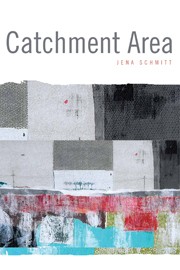Reviews
Poetry Reviews by Sara Cassidy
Johanna Skibsrud, I do not think that I could love a human being (Kentville: Gaspereau, 2010). Paperbound, 80 pp., $19.95.
Jena Schmitt, Catchment Area (Winnipeg: Signature, 2010). Paperbound, 96 pp., $14.95.
Johanna Skibsrud’s first book, published just ahead of her 2010 Giller awarded  novel, The Sentimentalists, is astonishing. It is formally nimble, grammatically curious, sure of its direction, and elaborately loyal to the language of thought, which, though not necessarily imagistic, remains lush in such skilled hands. That this accomplished book was written and published during Harper’s loutish regime attests to the insuppressible, human desire to question, to create, as well as to grieve, expansively, against cultural, political, and religious constraints.
novel, The Sentimentalists, is astonishing. It is formally nimble, grammatically curious, sure of its direction, and elaborately loyal to the language of thought, which, though not necessarily imagistic, remains lush in such skilled hands. That this accomplished book was written and published during Harper’s loutish regime attests to the insuppressible, human desire to question, to create, as well as to grieve, expansively, against cultural, political, and religious constraints.
As in The Sentimentalists, grief is the central concern, with death the gnarly subject to be opened and examined. For Skibsrud, the principal tools are light, time, space, and grammar. Life is capacious, Skibsrud decides as she holds the death of her father to the light: “I’ll last another hundred-billion years,” she writes without guile. In another poem, she decides, “If in a thousand years this / sadness that I am carrying around / with me inside will be burned up…I can / live with that.” Elsewhere, she writes of “Me that’s solid. Immutable and vast,” as if there were no tension between immutability and (galloping) vastness. But Skibsrud is an artist of the liminal. Language won’t be contained, therefore, her work argues and proves, neither should the common perceptions it mechanically contains. In “After Drinking Too Much Gin,” the floor that greets the drinker’s fall is only the floor “by accident, by / intervention, and as though / otherwise / I might have existed in entirely / different terms. In illimitable landscapes, / ever-broadening horizons – / and not just in terms, / like this, of up or down.”
Note the phrase “like this” in the last line. Or even, “as though / otherwise.” These tender hinges flip Skibsrud’s poems from where we are to the underside, from the poem being written to the poem being read, from Skibsrud the thinker and sufferer, to Skibsrud the writer and conjecturer, or, to refer to the poems’ more common tropes, from outer to inner, from land to water. But hers isn’t a simple, dualistic post-modern game, i.e. I am aware that I am pretending that I am not aware that I am writing this. The two consciousnesses interact, riff, defy the linearity of verb tenses.
In “Halfway Rock,” the collection’s opening poem, Skibsrud writes of events that preceded a friend’s death; “Which begs the question:” she interjects, by use of a stanza more deeply indented than the others, “Why write this poem in present tense, / knowing what I know?” In a later poem of the same section, Skibsrud interrupts herself in the usual, accepted way, by means of comments in parentheses, but as the poem develops, the parenthetical voice leaches its curved barriers, no longer providing, for example, background detail, but enlarging on the intention of the main text from a slightly different angle or point in time. Eventually, the two play witness to the story at hand, confirming Skibsrud’s observation elsewhere that “It is, to be alive, to be to a certain extent / unemptiable.”
Anyone who has lost someone has come up against the problem of past and present when speaking of them: was she my mother, or is she my mother, still? I have no other mother, or I had no other mother? And what of memories? Are these memories we shared now put to bed, too? Are they dead? Half dead? Skibsrud is up to the challenge, bending prepositions to tease out time’s infinite filaments. In “If In a Thousand Years” she addresses her lost one: “It is, for you, as though / everything had already / happened, now.” In “Visiting the Places of Early Childhood,” she writes, “All is as it was, and will be.”
Of her father’s dying, she states “It was original and whole.” The same can be said of Skibsrud’s work. It is original—inventive, questioning—yet is consummately whole. It offers considerable comfort to the comfortless.
There are two main ways that people give directions: in the first, you mentally rise above the city blocks for a bird’s-eye view, then chart the path. In the other, you stay on the ground and push through, step by step. If Skibsrud’s book adopts the first method, Jena Schmitt’s poetry collection, Catchment Area, takes the second, and while the second is supposedly less efficient and more encumbered, in poetry it has its advantages. Schmitt’s fifty-nine, mostly single-page poems are physical, dense, and excursive, yet held taut by an exacting intelligence. Shrewd, restless, reflective, they gather the hard detail of the vistas of travel, friendship, and reading—poems are lit from lines by Samuel Beckett to Murakami to Sappho—for evidence of occurrence.
Schmitt’s persisting concern is the continual dissolution of place. In “Points of  Vanishing,” she writes that “the landscape / becomes dated as soon as the first / line is drawn” and speaks of “geography sensitive / to the slightest breath.” In “After a letter by Jane Austen,” she asks, “Aren’t we / all sojourners in a strange / land, fated by a place / both realised and yet to be, // familiar yet misplaced.” The question is not unlike Skibsrud’s, and there are real intersections between the two women’s work: light pretends timelessness, certainty only hovers then vanishes, loss confounds with its relentlessness, its lack of finality.
Vanishing,” she writes that “the landscape / becomes dated as soon as the first / line is drawn” and speaks of “geography sensitive / to the slightest breath.” In “After a letter by Jane Austen,” she asks, “Aren’t we / all sojourners in a strange / land, fated by a place / both realised and yet to be, // familiar yet misplaced.” The question is not unlike Skibsrud’s, and there are real intersections between the two women’s work: light pretends timelessness, certainty only hovers then vanishes, loss confounds with its relentlessness, its lack of finality.
“An absence cannot be mapped,” Schmitt notes in the book’s eponymous poem; any evidence only points to “what remains and what is missing.” In the prose poem “Pinpoints,” she writes, “Wherever you go, you always leave something behind.” She means nothing comfortingly tangible, only the (elusive) fact of our having been somewhere. “Objects and places might disappear into the air, but not without notice...Like us, a city makes up its own mind about when and where to change directions. Without landmarks to guide you, try looking for fire escapes, street lamps, stained-glass windows, clotheslines, telephone poles.” That which we consider the furniture of our lives is in fact flotsam and accessory, no more comforting than memory. “Memory roots itself / for a short time, discretely,” Schmitt writes in “Point of Vanishing.” It’s all we get. That, and some small words:
What little
consolation in
the words there,
there, yet we
cling to them
like boats tossed
about a violent
horizon, too
far to be found,
and too late.
(“This Evening”)
A wonder of Schmitt’s poems is her slant imagery. Endings escape cloying summation, darting off, instead, eccentrically—uniquely perceptive—as if to echo in a room beside the poem, where the poem’s absence constructed itself as the poem was being written. In the lovely “Lament at the End of Summer,” she concludes, “Days like these— / they give themselves away. And we…wait for their confession: that the light / was taken, jewel-like from the trees. // How still it was, so close to willing.” A wonderful idea and a desperate hope, that light should have a will. Schmitt knows just how much light to let in. She knows the gentleness of stanza breaks and white space as well as how to pack words closely so that they carry weight and movement. “If words lacked apertures, acute / angles would break the horizon / into pieces like a cup hitting the wall,” she declares in “Point of Vanishing.”
The only real barrier to Schmitt’s book is the publisher’s choice of an over-large font size and too-white paper. In Gaspereau’s production, Skibsrud’s tone is matched by a modest font size, the letters gently inked yet deeply bedded in a creamy, fibrous page. Still, these two important books remind us of our ephemerality, in which we are equal, and free to be joyous.
—Sara Cassidy









